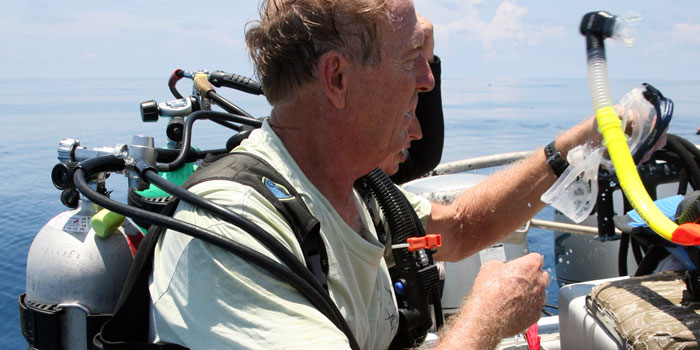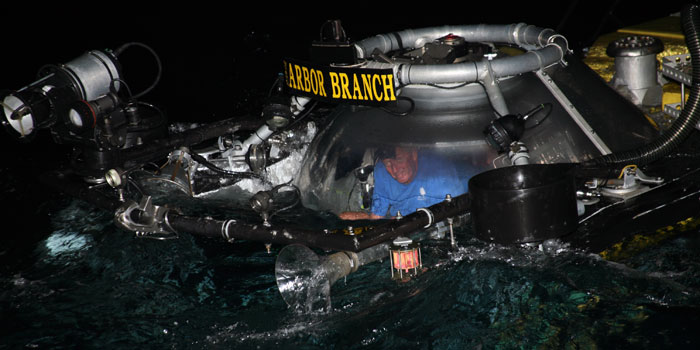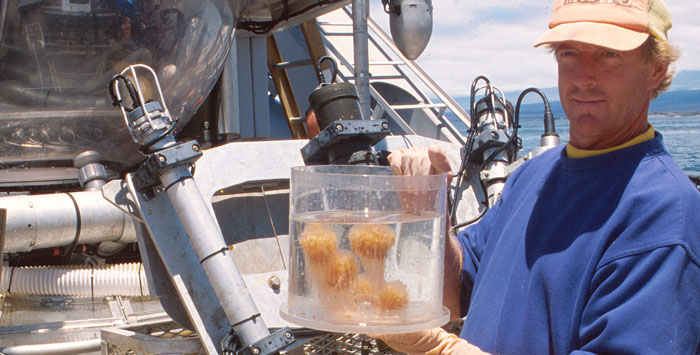Dr. John K. Reed: Video Transcript
Hear John talk about his job and what it's like to conduct science while at sea. Download (mp4, 188 MB).
What is a marine biologist?
I am John Reed, the senior scientist with the Division of Biomedical Marine Research at Harbor Branch Oceanographic Institution.
I am interested in a number of research projects. One is a deep water corals project that I’ve been working on for about 25 years and another is a biomedical research project that we’ve been working1on for about 15 years.
It is kind of odd that marine biologists or oceanographers do not have to work on the coast. Quite a few work inland from major universities in the Midwest. It really doesn’t matter now, especially with the Internet and opportunities to travel where you are. You can do your research from basically anywhere. We are fortunate to be located on the coast and we have our ships right here so we can go to sea relatively easily.
I’ve been around the world twice. We’ve had scuba diving and expeditions with the submersibles to Africa, the Azores, Eastern Atlantic, Spain, Portugal, throughout the Caribbean and Pacific Ocean, Galapagos Islands, Ecuador, Thailand, Seychells, Papa New Guinea. I’ve been very fortunate to travel as much as I have been able to. I have counted up the countries and I’ve visited over 60 countries primarily through work.
With my background and training as a marine biologist which involves a lot of training in scuba diving, collections, taxonomy, being familiar with different habitats and what lives there and the marine ecology aspect, I could get a job consulting with a private firm that is doing ecological research or consulting as a government position. There are state and federal positions with fish and wildlife and the department of natural resources, and there are opportunities with oceanographic institutions such as ours. With a masters degree, like I have you are somewhat limited to go to a university and head a program because typically you have to have a Ph.D. to do that.

Dr. Reed talks about his job, the many dives, the research, and the rewards.
The Job
I have made hundreds of dives with the Johnson Sea Link submersible to depths of 1/2 mile. Probably the most exciting thing that happened was when we dove the sub inside an undersea volcano and didn’t know it was a volcano until we were inside. We were about 600 feet deep under a ledge and down a hole and all of a sudden we realized we were inside a volcano and this thing shot us up about 200 feet a minute—that was kind of exciting!
The chemicals that we are discovering from organisms, deep sea animals and plants or even shallow water plants and animals, are found throughout the world. We find them in the Tropics and in the Arctic—from shallow water to depths of tens of thousands of feet and it is very similar to the drugs that have been developed that we have found in the plants and animals of the Amazon. That is where we think we have found most of our drugs, from terrestrial resources, microbes that live in dirt and from plants that live in the Amazon basin. It is only recently, perhaps the last 10 years or so that we have really started to look to the deep sea for equivalent drug discovery.
Our primary objective in the biomedical research division at Harbor Branch is to discover and develop drugs from marine organisms that can be used to treat human diseases. That is our hope and primary object—to find a new drug that can treat human diseases such as cancer or any number of diseases. Right now we have one drug that is a chemical that we discovered form a deep sea sponge nearly 15 years ago. It has taken this long to develop but this summer it has just started clinical trials for the treatment of human breast cancer. Right now it is showing very good potential for killing the breast cancer and other cancers such as colon cancer. We are very hopeful that it will make it to market. It has been a very long journey from when we first discovered it scuba diving in 1988 and then finally found the compound and discovered what it was and what it was good for. It’s sort of odd that a deep sea sponge such as this produces a chemical that humans can use to treat diseases. But they are just full of chemical and different compounds that the sponge probably uses for defense mechanisms such as toxins so it won’t be eaten; some toxic compound that prevents it from being eaten by a fish. We don’t even know why these sponges produce all these chemicals. They are there for us – it’s nature’s pharmacy for us to discover.

Dr. Reed shares his experience searching for medicines from the deep sea, exploring the Gulf of Mexico.
The Mission
For this upcoming NOAA Oceanography Exploration mission to the Gulf of Mexico, my position is chief scientist. Basically I am the mission coordinator for biomedical research. My main job started about year ago and started with “where are we going to go” and I had to do literature research and put together stacks and stacks of literature papers and research on the Gulf of Mexico and try to determine where we wanted to go. We are trying to discover new deep water reefs that people have never dived on and I had to find out where people had gone. Lot of it was leg work and research in the library. As far as this cruise itself, I am kind of like a travel agent. I have to do everything from arranging getting a truck to drive us to St. Pete with all of our gear, putting together our computer programs that we will put our data in, putting together all of our collection gear, the photography gear, the dive gear—basically overseeing the whole mission, working with all of the scientists, dealing with all of the problems people might have. When you are at sea it is a closed small ship and people get on each other’s nerves and I have to deal with that.
The main thing during the mission is to select sights, I will tell the caption where we I want to go for the next day and where I want to dive and direct the ROV dives of where we are going to put the ROV. Then Dr, Pomponi, Dr. Wright, and myself will do the actual ROV dives where we select what organisms we want to collect. Then each organism that we collect, I have to keep track of all of the documentation on it. I have to keep track of where it was collected, the taxonomy, the video and photos. I have to keep track of all that data and archive it. It is a huge amount of data.

Dr. Reed offers words of wisdom to up and coming marine biologists.
Words of Wisdom
One thing to keep I mind when you are trying to decide what to do—I know when I was in high school I had a hard time trying to decide what to do. Pick out something you feel comfortable with that you like to do and pursue that and don’t get frustrated. You don’t necessary have to go to the best university right away. Go to a junior college and take a few classes to figure out what you want to do. In the summer, try to volunteer or take internships which are a good way to find out your interests. You can see what people do and if you really like it. This also gives you contacts for the future.
When I was in high school I just took the basic college prep courses; a lot of biology and science. I really don’t think that in your early years of college that you need to worry about specializing early. It’s more important to get a good background in science and chemistry. I took typing at 40 and a lot of what we do now is computer work. All we do now is a lot of computer work so computer courses and software course and any of those will help. Computers are the number one thing we utilize in our work and then later on and in the later years as an undergraduate or as a master degree you can specialize and get more specific like marine ecology or whatever your interest is... I wouldn’t worry about specializing too early on. Get a good background and feel out what you want to do. You don’t have to decide the rest of our life today.
I have lots of hobbies. Basically every weekend when I am not working my wife and I like to go out in our Boston Whaler in the river and go fishing and stomp out in the mud flats, traipsing through the mangroves, or scuba diving. We like to go kayaking, we just started yoga, I used to do karate, mountain climbing, hiking – lots of physical stuff we like to do.
Published September 3, 2018
Return to profile